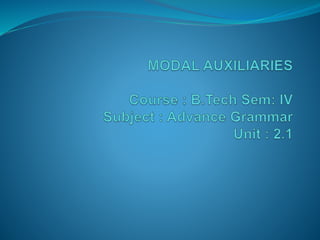
B.tech iv u-2.1 modal auxiliaries
- 2. Modal Auxiliaries Modal Auxiliaries are Helping Verbs. While preparing sentence in Active Voice, original form of verb is used with these modal auxiliaries. While preparing sentence in Passive Voice, “be + Past Participle of verb” is used with these modal auxiliaries. Ex. Will/Shall, Would / Should, Must, Have to, Could, May, Might etc.
- 3. Will /Shall “Shall” is generally used with “I” and “we”. “Will” is generally used with “you”, “he”, “she”, “it” and “they”. Ex. He will play cricket. We shall buy a new book. “to be going to” / “to be to” can be used in place of “shall/will”. Ex. He is going to build a new house. He is to build a new house. He will build a new house.
- 4. Should “should” always denotes Moral Duty. “should” is also used to give Suggestion / Advice. “should” is used with every subject without making any change in verb. “should” can be used with any form Present Tense and Future Tense. The past tense of shall is “would”. Ex. The pupils should work regularly. We should obey our elders.
- 5. Must “Must” shows unavoidable duty. It is a helping verb used … to show that “we have no choice without this action”. From legal view, “must” is used to mention a probable loss if not taken the said action. “must” is also used to enforce decision, confident will, ban on some thing, forceful advice, any possibility etc. Ex. The room is full of gas. You must not burn match stick. You must drive to the left side.
- 6. Must “must” is used with any Subject without any change in sentence. “must” is used in the same way as that of “should” in Present Tense & Future Tense. In Interrogative sentences, “must is used before Subject. In negative sentences, “not” is used after “must”.
- 7. Have to “have to” is used to denote “compulsion to do the work”. In present tense, “have to” is used for plurals and “has to” is used for singulars. In past tense “had to” is used for both singulars & plurals. In future tense, “shall have to” or “will have to” are used. “have to” shows the compulsion to do the work due to external forces.
- 8. Have to Ex. Today is not a holiday. I have to go to school. In present tense, to make a negative sentence or interrogative sentence, “do” or “does” are used. In positive / negative / interrogative sentences, “have to + Verb” is used instead of verb. Ex. I do not have to finish the work because my brother will do the work. Do I have to finish the work? We have to attend the meeting.
- 9. Would “would” is the past tense of “will”. “would” is used to show “request”. When Subject is generally “you” and sometimes “please” is used at the end of the sentence, commonly, it is Interrogative sentence. “would” is also used to show choice or will/wish.
- 10. Would In interrogative / negative sentences, “would” is used before subject. In negative sentence, “not” is used with “would”. Ex. What would you have, tea or coffee? I would do this work. I would not eat this dish.
- 11. Could “could” is the past tense of “can”. “could” shows “ability”. Sometimes, “could” is used to show “request”. In interrogative sentence, “could” is used with “you” as well. “could” can be replaced by “was able to”/ “were able to”. Ex. I was sick. So I could not attend the party. Could you help me to do this sum?
- 12. May “may” shows probability of happenings. “may” is used for permission, purpose, good wishes, request, blessings and possibilities. Ex. May I come in Sir? There are clouds in the sky. It may rain. May God bless you.
- 13. Might “might” is the past tense of “may”. “might” denotes a possibility of happening. Ex. He might be in the class-room.
- 14. Thanks to …. http://www.ego4u.com/en/cram-up/grammar/prepositions A ready reckoner in English Grammar & Composition (Std.X) by Dineshbhai J. Shah, Dr. Janakbhai B. Shah and Bharatiben R. Shah (Atul Prakashan) Grammar.ccc.commnet.edu/grammar/auxiliaries http://www.englisch- hilfen.de/en/grammar_list/hilfsverben.htm http://www.myenglishpages.com/site_php_files/grammar- lesson-modals.php#.VKUS98nR3IU http://grammar.about.com/od/mo/g/modalterm.htm
